
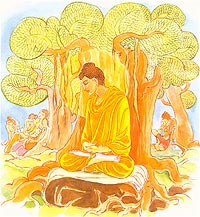
Verse 179. The Buddha Cannot Be Tempted
That Buddha traceless of infinite range
whose victory none may e’er undo,
whose vanquished follow to no world,
then by which track will you trace him?
Explanation: The Buddha’s victory has not been won incorrectly.
No one can turn Buddha’s victory into defeat. Nothing that he
has conquered can return, or pursue him, because his conquest is so
complete: His ken infinite, In what way can you tempt or ensnare him.
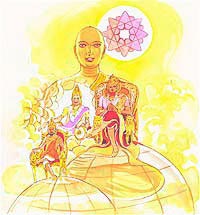
Verse 180. The Buddha Cannot Be Brought Under Sway
That Buddha traceless of infinite range
in whom’s no entangling craving
and no ensnaring not anywhere lead,
then by which track will you trace him?
Explanation: The Buddha, in whom there is no thirst (tanha)
for grasping to the net that lures, whose ken is infinite, in what
way can you lure him away?
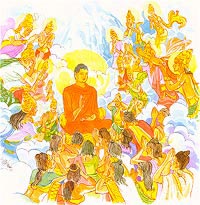
Verse 181. Gods And Men Adore The Buddha
E’er intent on concentration,
joyful in peace of letting go,
mindful, wise, the perfect Buddhas,
to even devas they are dear.
Explanation: Those noble and wise ones are intent on meditation.
They are bent on conquering defilements – that is achieving Nibbana.
They are mindful; and such enlightened ones are beloved by everyone.
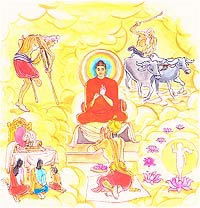
Verse 182. Four Rare Opportunities
Human birth is hard to gain,
hard for mortals is their life,
to come to Dhamma True is hard,
rare the Buddha’s arising.
Explanation: It is rare that one is born a human being, in
this cycle of rebirth. It is difficult and rare to get the opportunity
to hear the good teaching, It is, indeed, rare for the birth of a
Buddha to occur.
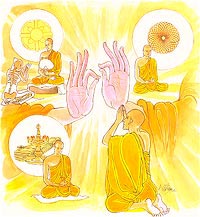
Verse 183. The Instructions Of The Buddha
Every evil never doing
and in wholesomeness increasing
and one’s heart well-purifying:
this is the Buddha’s Teaching.
Explanation: Abandoning all evil and purifying one’s
own mind by oneself – this is the Teaching of the Buddha.
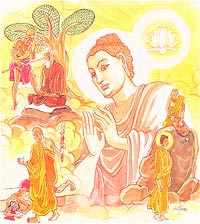
Verse 184. Patience Is A Great Ascetic Virtue
Patience’s the austerity supreme,
Nibbana’s supreme the Buddhas say.
One who irks or others harms
is not ordained or monk become.
Explanation: Enduring patience is the highest asceticism.
The Buddhas say that imperturbability (Nibbana) is the most supreme.
One is not a renunciate if he hurts another. Only one who does not
harm others is a true saint (samana).

Verse 185. Noble Guidelines
Not reviling, neither harming,
restrained to limit ‘freedom’s’ way,
knowing reason in one’s food,
dwelling far in solitude,
and striving in the mind sublime:
this is the Buddha’s Teaching.
Explanation: To refrain from finding fault with others; to
refrain from hurting others, to be trained in the highest forms of
discipline and conduct; to be moderate in eating food; to take delight
in solitude; and to engage in higher thought (which is meditation).
This is the Buddha’s Teaching.
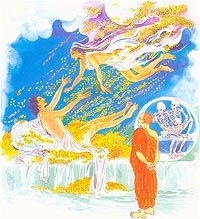
Verse 186. Sensual Pleasures Never Satiated
Not by rain of golden coins
is found desires’ satiety,
desires are dukkha, of little joy,
thus a wise one understands.
Explanation: Insatiable are sensual desires. Sensual desires
will not be satisfied even with a shower of gold. The wise knows that
sensual pleasure bring but little satisfaction and much pain.
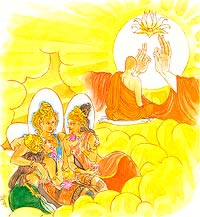
Verse 187. Shun Worldly Pleasures
Even with pleasures heavenly
that one finds no delight,
the perfect Buddha’s pupil
delights in craving’s end.
Explanation: The discipline of the Buddha does not even go
after heavenly pleasures. The discipline of the Buddha has his mind
fixed only on the process of ending cravings.
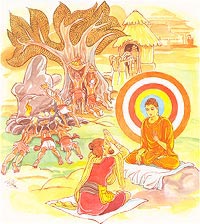
Verse 188. Fear Stricken Masses
Many a refuge do they seek
on hills, in woods, to sacred trees,
to monasteries and shrines they go.
Folk by fear tormented.
Explanation: Human beings who tremble in fear seek refuge
in mountains, forests, parks, trees, and shrines.
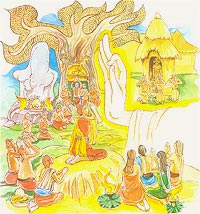
Verse 189. Those Refuges Do Not Help
Such refuge isn’t secure,
such refuge isn’t supreme.
From all dukkha one’s not free
unto that refuge gone.
Explanation: These are not secure refuges. The are not the
supreme refuge. One who takes refuge in them is not released from
all sufferings.
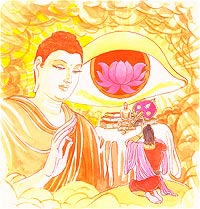
Verse 190. Seeing Four Noble Truths
But going for refuge to Buddha,
to Dhamma and the Sangha too,
one sees with perfect wisdom
the tetrad of the Noble Truths:
Explanation: If a wise person were to take
refuge in the Buddha, Dhamma and the Sangha, he will observe the four
Noble Truths with high wisdom.
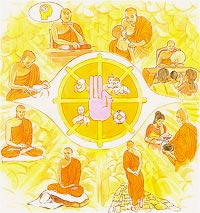
Verse 191. The Noble Path
Dukkha, its causal arising,
the overcoming of dukkha,
and the Eight-fold Path that’s Noble
leading to dukkha’s allaying.
Explanation: The four extraordinary realities are suffering;
the arising of suffering; the ending of suffering; the eight-fold
path leading to the ending of suffering.
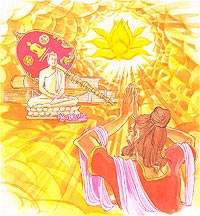
Verse 192 The Refuge That Ends All Suffering
Such refuge is secure,
such refuge is supreme.
From all dukkha one is free
unto that refuge gone.
Explanation: This refuge in the Triple Refuge is, of course,
totally secure. This is the supreme refuge. Once you take this refuge
you gain release from all your sufferings.
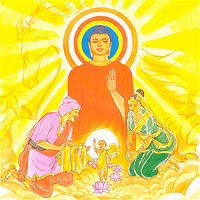
Verse 193. Rare Indeed Is Buddha’s Arising
Hard to find the pure and noble
who isn’t born just anywhere,
wherever one so wise is born
that family thrives happily.
Explanation: The Buddha is rare indeed. Such a rare person
is not born everywhere. If such a noble and wise person were born
in a clan, that clan will reap happiness.
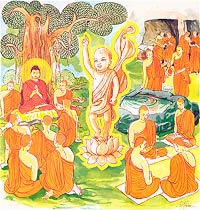
Verse 194. Four Factors of Happiness
Blessed is the birth of Buddhas,
blest True Dhamma’s Teaching,
blest the Sangha’s harmony
and blessed is their striving.
Explanation: The arising of the Buddha is joyful. The proclamation
of the Dhamma is joyful. The concord of the Sangha is joyful. Joyful
indeed is spiritual practice in harmony.
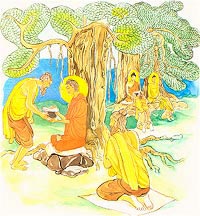
Verse 195. Worship Those Who Deserve Adoration
Who venerates the venerable
Buddhas or their disciples,
have overcome the manifold,
grief and lamentation left.
Explanation: Those who have gone beyond apperception ( the
normal way of perceiving the world), who have crossed over grief and
lamentation. They deserve to be worshipped; namely, the Buddhas and
their disciples.
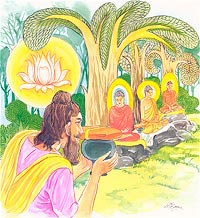
Verse 196. Worship Brings Limitless Merit
They who are ‘Thus’, venerable,
cool and free from every fear –
no one is able to calculate
their merit as ‘just-so-much.
Explanation: One who worships those who have attained imperturbability
and do not tremble or fear, earns much merit. The merit earned by
such a person cannot be measured by anyone.

